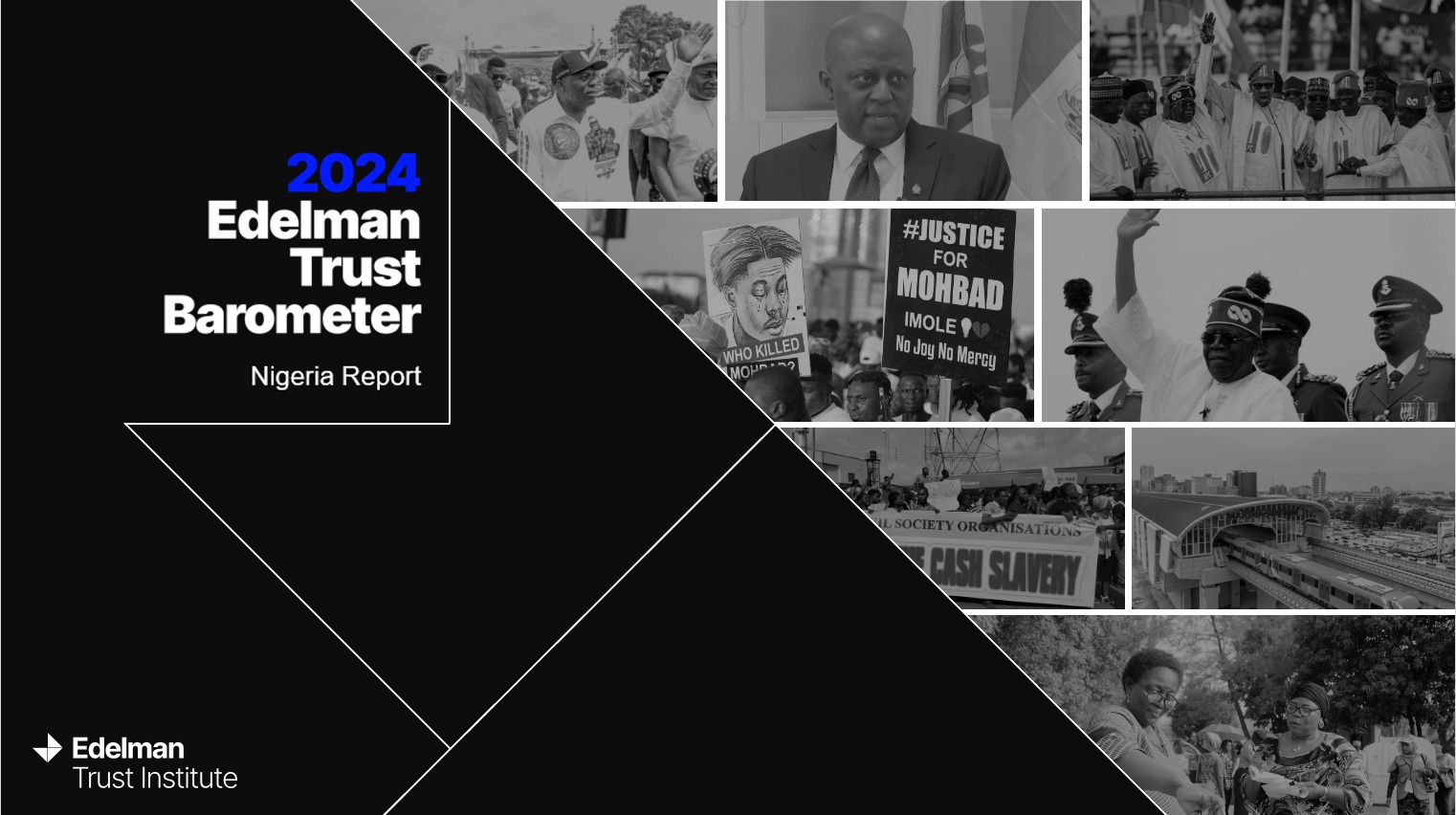In the wake of a global debate on the role of innovation in society, Nigeria is 1 of only 4 countries globally more likely to say that innovation is well managed in their country– according to the 2024 Edelman Trust Barometer.
Edelman’s global2024 research, Innovation in Peril, posited that rapid innovation offers the promise of a new era of prosperity, but instead risks exacerbating trust issues, leading to further societal instability, and political polarisation.
The data revealed that the average of the 28 participating countries were nearly two times more likely to say innovation was poorly managed. However, the local research has shown two African nations bucking the trend, along with UAE and Saudi Arabia. On average, Nigeria is on par with Kenya at 35% of respondents saying that innovation was well managed, and 41% of Nigerians neutral on the issue. This belief in innovation being well-managed locally was surpassed only by Saudi Arabia at 37%.
“This year’s Trust Barometer captures a critical transformation in the trust landscape of Nigeria. Amidst economic challenges and heightened public scrutiny, there is an improved trust in all spheres of the country. Further, it is clear from the data that people want to feel a sense of credible authority behind how innovation is managed and rolled out to the public,” said Karena Crerar, CEO for Edelman Africa.
Nigerians’show of trust may be testament to their reliance on scientists as leaders in building trust in innovation within society.
The barometer shows that an overwhelming majority of Nigerians believe scientists (84%), experts (80%), and academics (80%) should play a leading role in managing the introduction of innovation.
However, the data casts a spotlight on how scientists engage with the public, as a marginal but critical 37% of Nigerian respondents say scientists do not know how to communicate with them.
“Our data shows that while scientists are still trusted within society as technical experts, to further build trust in expert recommendations there is a need to explain the research in an accessible and transparent way,” said Crerar.
The survey shows that while there have been significant strides in the advancements of vaccines, AI technologies, and green mandates – there exists an equal pushback against these innovations. This begs the question: “What will lead society to accept or reject innovation?”
“While breakthroughs in healthcare and AI have increased efficiencies that led to saving millions of lives and livelihoods, explaining the science and effectively managing its impacts is the essential lever in advancing the wider acceptance of innovation,” Crerar added.
Nigerians displayed exceeding levels of trust in their peers to tell them the truth about new innovations (83%),with 75% saying they also trust scientists for the same.
CEOs of businesses are increasingly expected to address the impacts of innovation, with 68% of Nigerian respondents saying they expected CEOs to manage changes occurring in society and not just in their businesses.
There is also an increasing call for a collaborative approach between business and government as innovation surges, with 77% of Nigerians saying they would trust these partnerships more in technology-led changes within society. This finding is consistent across the four African countries surveyedwith majority agreement: Morocco (51%), South Africa (61%), Kenya (72%), and Nigeria (77%).
“Our research across the continent has shown business leaders and scientists are most trusted to introduce innovation into society, with an emphasis on partnering with government. CEOs need to safeguard jobs and take a stand on emerging ethical concerns. It is crucial for leaders to ensure that technological advancements are aligned with societal needs and values, fostering a future where innovation promotes inclusivity and sustainability,” said Karena Crerar, CEO for Edelman Africa.
According to Kwame Senou, Executive Director, The Holding Opinion and Public Company, a strategic advisor of Edelman’s West and Central African Partner Network: “Nigeria shows a positive trend with a trust index of 61, reflecting a 5-point increase from the previous year. This signals a growing confidence in its institutions among the general population. This improvement positions Nigeria favourably among other developing nations, emphasising its potential for further societal and economic advancements.”
“Overall, the 2024 Edelman Trust Barometer for Nigeria paints a picture of a society grappling with rapid changes and the urgent need for institutional leaders – private and public – to foster a radical transformation. As does the rest of the world, Nigeria continues to navigate through these turbulent times, while striving to build and maintain trust across all sectors,” he concluded.
Other key findings include:
- Government is the least trusted institution to tell the truth about innovation, and 73% of Nigerians say government leaders are purposely trying to mislead people by saying things they know are false or gross exaggerations.
- Journalists and reporters are also seen as increasingly deceitful with 69% of Nigerians saying they purposely are trying to mislead people – up by 8pts from last year.
- In Nigeria, NGOs lead in terms of the institutions trusted to integrate innovation into society at 75%, followed by business at 72%.
- A majority of Nigerians, 59%, say that government regulators lack adequate understanding of emerging technologies to regulate them effectively.
- While there is overwhelming trust in scientists to tell the truth about new innovations, 55% of Nigerians say that government and organizations that fund research have too much influence on how research is done.
- A resounding 88% of Nigerian respondents also believe that when institutions mismanage innovation, the system favours the rich, and issues of fairness and capitalism are called into question.
To access the full report please click here

